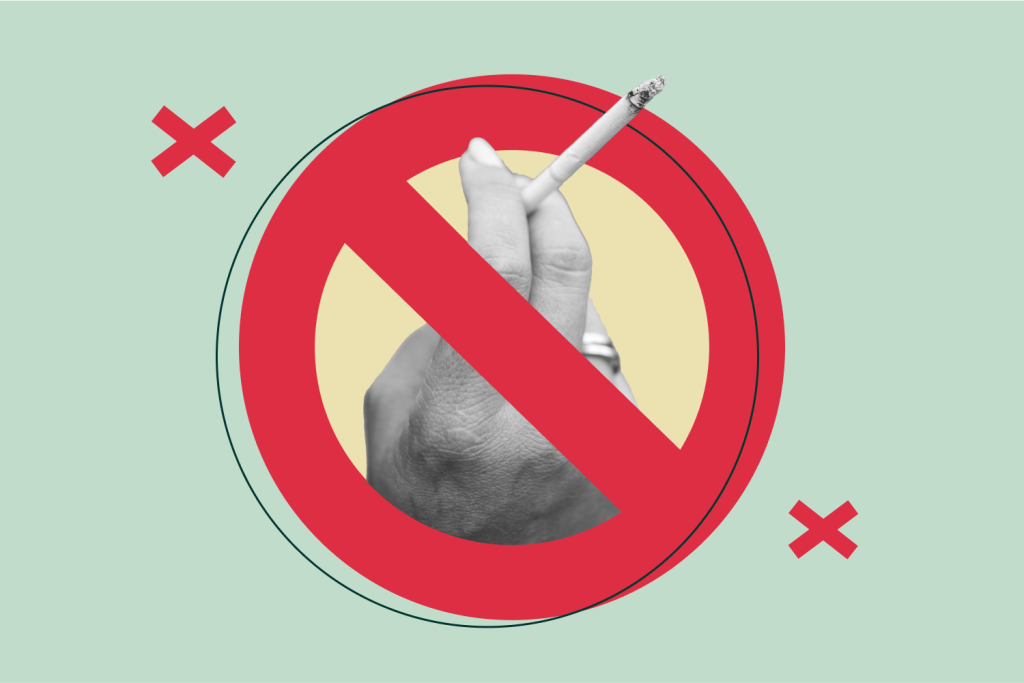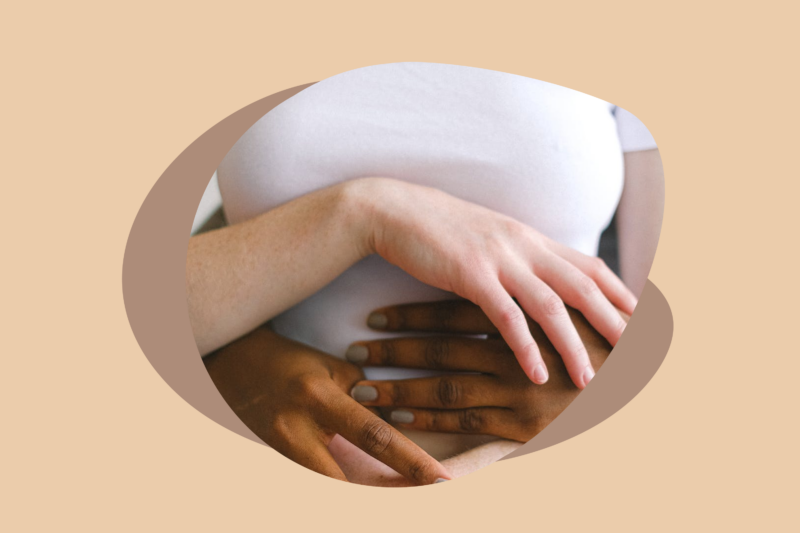13 Things To Avoid When Trying to Get Pregnant (TTC Guide)

You know that you want to get pregnant, but did you know that your lifestyle can play a huge role in your TTC journey? From BPA to caffeine, it’s important for expectant parents to be aware of the negative effects that certain foods and chemicals can have on fertility and early pregnancy.
To help, here’s an overview of 12 things that expectant parents should avoid if they are looking to plan a pregnancy. We’ll also cover a few strategies that can help make the transition to a healthier lifestyle a bit easier.
13 things to avoid when trying to get pregnant
Smoking
According to the American Society for Reproductive Medicine, those who smoke are twice as likely to experience infertility when compared to those who do not smoke. Why? Because the chemicals in cigarette smoke are known to decrease egg quantity, harm the genetic material of eggs, and even decrease sperm quality and motility. The good news however is that some of these negative effects can be reversed in cases where one or both partners quit smoking.
Gaining or losing a lot of weight
Being overweight or underweight can have a huge impact on your fertility. In both scenarios, hormone patterns are often disrupted, and this can lead to anovulation, cycle irregularity, and difficulties with getting pregnant. To better manage your weight while TTC, we recommend starting with small, incremental changes that will be sustainable for the long haul. It may also be worth speaking with your doctor to determine whether or not you have any underlying conditions that are making it difficult to maintain a healthy weight.
Excess caffeine
Consuming too much caffeine can also make it difficult to get pregnant. This is because excess caffeine has been linked with infertility, miscarriage, and low birthweight. The American College of Obstetricians and Gynecologists recommends consuming no more than 200mg of caffeine per day, which is approximately one mug of filtered coffee, two mugs of instant coffee, or two mugs of tea.

A little extra support from an expert can go a long way
Book an online consultation with one of our Hormone Health Coaches.
Schedule NowToo much alcohol
Alcohol not only interferes with your hormones (which may make it difficult to get pregnant in the first place), but it is also particularly dangerous to a fetus in the early stages of pregnancy. Research shows that drinking alcohol during the first trimester can negatively affect growth, brain development, and central nervous system functioning. To protect your future pregnancy whilst trying to conceive (TTC), it’s best to avoid alcohol and opt for non-alcoholic beverages instead.
Excess exercise
Moderate exercise while TTC is good for keeping your hormones and weight in balance. However, research suggests that those who exercise heavily for more than 60 minutes per day may be at an increased risk of anovulation. This lack of ovulation can lead to irregular periods, which can make it very difficult to get pregnant.
For inspiration on what types of exercises to try ahead of pregnancy, check out our article 5 Pre Pregnancy Workouts: How to Prepare Your Body when TTC.
Chronic stress
It is normal to experience small amounts of stress in our daily lives. However, chronic, high levels of stress are associated with lower chances of conception. This is because those with high levels of stress are more likely to experience low libido and hormone imbalance. They are also more likely to have a weakened immune system, which can also contribute to reduced fertility.
For more information on how stress impacts fertility, check out our article Stress and Fertility: How It’s Connected and How to Manage It.
Sperm-harming lubricants
Certain ingredients commonly found in vaginal lubricants are known to affect how effectively sperm can travel through the female reproductive tract. This is known as sperm motility, and it is critical to conception. The best way to avoid sperm-harming lubricants is to always check the ingredients and avoid lubricants that contain petroleum, propylene glycol, glycerin, parabens, silicone, and Nonoxynol-9 (N-9). When scanning labels, look for lubricants that are advertised as “glycerine-free”, “PHP-balanced” and/or “isotonic”.
BPA
BPA (also known as Bisphenol-A) is an industrial chemical that is associated with female infertility and even miscarriage. This chemical is found in hard plastics like plastic storage containers, packaging, water bottles, and cutlery. In addition to infertility, BPA has also been linked to high blood pressure, type 2 diabetes, and cardiovascular disease. It is also known to have negative health effects on developing fetuses. It may not be possible to avoid all BPA exposure, however, you can reduce your exposure by swapping out hard plastics with glass, silicone, and stainless steel.
Foods to avoid when trying to get pregnant
Processed foods
Consuming high levels of processed foods like packaged snacks, commercially baked goods, frozen pizzas, and bottled spreads/dressings not only make it difficult to manage your weight, but they can also make it difficult to get pregnant. This is because processed foods are high in trans fats, which are known to have a negative effect on fertility. To avoid trans fats, opt for healthier alternatives like natural oils, plant-based meat and dairy products, and foods high in Omega-3 fatty acids.
High mercury fish
In men, mercury can affect the quality, quantity, and motility of sperm. In women, mercury is also known to negatively affect hormone functioning. If you are TTC, try to avoid fish that are high in mercury and opt for fish with lower mercury levels. According to the Food and Drug Administration (FDA), fish that are high in mercury include king mackerel, shark, marlin, swordfish, bigeye tuna, tilefish, and orange roughy. Safer options include cod, crab, haddock, salmon, and shrimp, among others.
Soda and fruit juice
Research shows that consuming one sugary drink per day can lead to decreased fertility in both men and women. The most common sugar-sweetened beverages include sodas, energy drinks, and fruit juices. While it may not be possible to eliminate all sugary drinks from your daily diet, you can still find ways to limit the amount that you consume. For example, instead of drinking a full glass of orange juice, try topping off half of a glass with sparkling water. Sparkling water is also a great alternative for those who love the fizz in sodas.
Red and processed meat
Red and processed meats are also high in trans fats, saturated fats, and nitrates, which are associated with decreased fertility in both men and women. Examples of red meats include beef, lamb, and pork, while processed meats encompass sausages, bacon, deli meats, and canned meats. Again, it may not be realistic to eliminate all of these meat options from your diet. However, you can reduce your overall consumption by swapping out red meats with white meats (like chicken, fish, or turkey) or by incorporating more plant-based alternatives into your diet.
Unpasteurized cheese
According to the Center for Disease Control (CDC), unpasteurized cheese is 50-160 times more likely to cause a listeria infection compared to pasteurized cheese. This is why individuals are discouraged from consuming unpasteurized cheese while pregnant or TTC. The most common cheeses that tend to be unpasteurized (i.e. unsafe to eat while pregnant or TTC) include brie, camembert, and feta. Varieties that tend to be pasteurized include cheddar, American, pepper jack, and mozzarella. If you’re unsure, always double-check the packaging before consuming.
When should you start avoiding bad food and habits if TTC?
When it comes to making positive lifestyle choices ahead of a potential pregnancy, the sooner you start the better. Kicking any bad habits (like smoking or binge drinking) will not only improve your fertility and help you get pregnant quicker, but it will also ensure that your body is a safe environment for a fetus to thrive in.
A good place to start is by taking stock of basic elements of your lifestyle that are known to influence fertility. You can then evaluate each element and decide what areas you need to work on. Elements to consider include things like your:
- Diet
- Exercise routine
- Smoking habits
- Drinking habits
- Sleep hygiene
- Stress levels
It’s important to note that making changes to your lifestyle is not always easy. To ensure that your positive changes are sustainable, we recommend starting small, setting achievable goals, and being patient with yourself. You may not be able to overhaul your entire lifestyle overnight, but you can still make small improvements each day that will be healthier for both you and your potential pregnancy.
For a more comprehensive look at how to cultivate a healthy diet and lifestyle while TTC, check out our articles Pre-Pregnancy Diet: What Foods Should You Be Eating When TTC? and 13 Ways to Balance Hormones Naturally (Lifestyle Guide).

Mira’s Editorial Process
All content produced by Mira meets stringent editorial standards, ensuring excellence and accuracy in language and medical precision. Every piece undergoes thorough fact-checking and review by qualified professionals. Check out our full editorial process to learn more.










